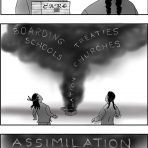Reconciling the Conjunction of “Home” and “Native Land”
Reconciling the Conjunction of “Home” and “Native Land”
Categories: Indigenous, Lectures and Seminars | Intended for Carleton Community, Current Students, Staff/Faculty

Location Details
Online via Zoom
Contact Information
Department of Sociology and Anthropology, contact via email, soc-anthro@carleton.ca
Registration
No registration required.
Cost
Free
About this Event
Host Organization: Department of Sociology and Anthropology
More Information: Please click here for additional details.
The opening lines to the Canadian national anthem are, “O Canada! Our home and native land!” In this moment of Truth and Reconciliation the conjunction of "home" and "native land" requires closer examination. Does home mean the same thing to settlers as it does to Indigenous peoples? How many generations must live in a place for that place to be considered native land? Can we torture the semantic properties interpreted by diverse constituencies in such a way we can reconcile differences?
Reconciliation suggests we revisit a prior conciliatory moment. Is that true for Canada? Colonial cartographies of discovery, cartographies of conquest, and cartographies of erasure suggest we are just now beginning the conversation on conciliation rather than reconciliation. It took five hundred years to get us all to the point when we must grapple with the truth of the slow violence of colonization and the prospects of what forms reconciliation may take. These are not easy conversations but they are necessary discomforts if we are to imagine our collective future.
Bernard C. Perley (Director and Associate Professor, The Institute for Critical Indigenous Studies at the University of British Columbia) is Maliseet from Tobique First Nation, New Brunswick. He is an activist/advocate Indigenous anthropologist and has been active in the American Anthropological Association. His language research and advocacy continue to be expressed through research, publications and creative work. This includes community-based projects such as collaborative art installation pieces, presentations, and language revitalization workshops, as well as his personal cartoon series Having Reservations, which explores humor as a means of healing historical trauma associated with centuries of colonial oppression of Indigenous peoples of North America. His published series Going Native (in the professional publication Anthropology News) is a critical reflection on Anthropology history, contemporary practice, and disciplinary future.
Bernard’s critical analysis of discourses on language death and endangerment in his monograph Defying Maliseet Language Death: Emergent Vitalities of Language, Culture, and Identity in Eastern Canada (Nebraska 2011) shifts metaphors of “language death and extinction” toward metaphors of “language life and vitality”. He asserts an Indigenous praxis of “emergent vitality” as an empowering stance for communities who are working toward language life. His ongoing writing, research, and teaching integrates language, landscape, and identity to enhance Indigenous language revitalization.